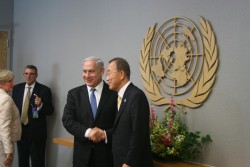
Ready for a peaceful handshake? Prime Minister Netanyahu (Left) and UN Sec-Gen Ban. Illustrative. By Joshua Spurlock
More than two weeks after Hamas rejected a full ceasefire with Israel, the sides have reportedly agreed to an unconditional three-day lull in fighting for humanitarian reasons. According to a press statement released by US and the United Nations on Thursday, the ceasefire was set to begin at 8 am on Friday, August 1 and last for 72-hours, “unless extended.”
The statement, posted on the US State Department website, said Israel and the Palestinians would send delegations to Egypt for negotiations on a “durable” ceasefire “immediately.” In the interim, Israel will be able to keep its troops inside Gaza territory, as the statement said the “forces on the ground will remain in place.” This was crucial for Israel.
Earlier on Thursday, Israeli Prime Minister Benjamin Netanyahu made it clear that they would not accept any long-term ceasefire that did not allow the destruction of the terror tunnels leading from Gaza to Israel.
“These tunnels would have enabled Hamas to abduct and murder civilians and IDF soldiers via simultaneous attacks from many tunnels that penetrate our territory,” said Netanyahu in a statement released by his office.
“…As of now, we have neutralized dozens of terrorist tunnels and we are determined to complete this mission, with or without a ceasefire, and therefore I will not agree to any proposal that does not allow the IDF to complete this work which is important for the security of Israel’s citizens.”
As of July 27, the IDF had uncovered 32 such tunnels, according to the IDF Blog. “There is no guarantee of 100% success… but the IDF actions have impressive results in the field and these actions are continuing at full strength even now,” said Netanyahu.
The Israeli leader said that in addition to the destruction of the tunnels, they have hit “thousands of terrorist targets,” ranging from command centers to rockets. “These achievements and the neutralization of the tunnels are only the first stage in the demilitarization of the Gaza Strip. The US, the EU and other important elements in the international community have accepted our position [about demilitarizing Gaza] and I must say that this was not an easy thing to achieve but we did it together, with hard work.”
The next round of hard work may prove just as difficult, as Israel seeks a lasting ceasefire that prevents Hamas from easily striking at Israeli civilians for the near future. The US and UN statement about the humanitarian ceasefire noted that “the parties will be able to raise all issues of concern in these negotiations” in Egypt.
Israel is concerned about the tunnels, which could allow terrorists to sneak into communities and commit murder or kidnapping. Hamas, on the other hand, has been very vocal to various media outlets that they refuse a ceasefire that does not address the blockade on the Gaza Strip, which Israel and Egypt have enforced in large part to prevent the influx of weapons and terrorists.
Now it remains to be seen if this ceasefire will hold and turn into a long-term one after the others have all fallen apart. Three days of talking to address what more than three weeks of fighting hasn’t resolved.
(By Joshua Spurlock, www.themideastupdate.com, July 31, 2014)
